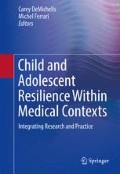Abstract
This chapter examines the experiences of disabled children and their families. It explores strengths approaches and identifies how effective support enables families and children to build resilience. Strengths perspectives encourage understanding of the diversity of family life and the ways in which interventions with families can draw on their strengths and capacities. The chapter considers how medical practitioners (general practitioners, nurses, social workers and specialist services) can promote the well-being of children and families. Services which make a positive difference are available to families at the times they require them and are able to adapt to meet the changing needs of families and children over their life course. At times, albeit often unintentionally, services exacerbate the stress experienced by families and as a result limit the life experiences of disabled children and their opportunities to participate in their communities. The chapter explores how strengths perspectives can address these challenges. It identifies how medical practitioners can form authentic and respectful relationships with families that enhance their coping skills and build long-term strategies for enhancing family life. Of particular interest is how practitioners can build collaborative relationships that facilitate accessible and responsive services.
Access this chapter
Tax calculation will be finalised at checkout
Purchases are for personal use only
References
Carers New Zealand, & The New Zealand Carers Alliance. (2007). Caring for New Zealand carers: Your life, your work, your say—A discussion document. Ponsonby, New Zealand: Carers New Zealand and The New Zealand Carers Alliance.
Collings, S. (2009). Who cares for people with schizophrenia: Family carers’ health, circumstances and adjustment. Featherston, New Zealand: The Families Commission.
Gilligan, R. (2004). Promoting resilience in child and family social work: Issues for social work practice. Social Work Education, 23, 93–104.
Guo, W., & Tsui, M. (2010). From resilience to resistance: A reconstruction of the strengths perspective in social work practice. International Social Work, 53(2), 233–245.
Hallahan, L. (2010). Legitimising social work disability policy and practice: Pain or praxis? Australian Social Work, 63(1), 117–132.
Handley, K., Horn, S., Kaipuke, R., Maden, B., Maden, E., Stuckey B., … Sanders J. (2009). The Spinafex effect—A theory of change. Featherston, New Zealand: The Families Commission.
Houston, S. (2010). Prising open the black box: Critical realism, action research and social work. Qualitative Social Work, 9(1), 73–91.
Liebenberg, L., & Ungar, M. (2009). Introduction: The challenges in researching resilience. In L. Liebenberg & M. Ungar (Eds.), Researching resilience (pp. 3–25). Toronto, ON, Canada: University of Toronto Press.
Merriman, B., & Canavan, J. (2007). Towards best practice in the provision of respite services for people with intellectual disabilities and autism. Galway, Ireland: Child and Family Research Centre, National University of Ireland.
Ministry of Health. (2001). The New Zealand disability strategy: Making a world of difference—Whakanui Oranga. Wellington, New Zealand: The Ministry of Health.
Munford, R. (1994a). The politics of care-giving. In M. H. Rioux & M. Bach (Eds.), Disability is not measles: New research paradigms in disability (pp. 265–284). Toronto, ON, Canada: L’Institut Roeher Institute.
Munford, R. (1994b). Caregiving—A shared commitment. In K. Ballard (Ed.), Disability, family, Whanau and society (pp. 265–292). Palmerston North, New Zealand: Dunmore Press.
Munford, R., & Bennie, G. (2009). Social work and disability. In M. Connolly & L. Harms (Eds.), Social work: Contexts and practice (pp. 209–221). South Melbourne, VIC, Australia: Oxford University Press.
Munford, R., & Bennie, G. (2013). Social work and disability. In M. Connolly & L. Harms (Eds.), Social work: Contexts and practice (pp. 194–205). South Melbourne, VIC, Australia: Oxford University Press.
Munford, R., Georgeson, S., & Gordon, J. (1994). Social work with people with disabilities and their families. In R. Munford & M. Nash (Eds.), Social work in action (pp. 265–295). Palmerston North, New Zealand: Dunmore Press.
Munford, R., & Sanders, J. (2005). Working with families: Strengths-based approaches. In M. Nash, R. Munford, & K. O’Donoghue (Eds.), Social work theories in action (pp. 158–173). London, England: Jessica Kingsley.
Munford, R., & Sanders, J. (2008). Assessment of families. In W. Rowe & L. A. Rapp-Paglicci (Eds.), Comprehensive handbook of social work and social welfare: Social work practice (pp. 399–422). Hoboken, NJ: Wiley.
Munford, R., Sanders, J., & Maden, B. (2012). Building strengths in families and communities. In J. Duncan & S. Te One (Eds.), Comparative early childhood education services: International perspectives (pp. 57–77). New York, NY: Palgrave Macmillan.
O’Brien, P., & Sullivan, M. (2005). Allies in emancipation: Shifting from providing service to being of support. South Melbourne, VIC, Australia: Thomson.
Sanders, J., & Munford, R. (2010). Working with families: Strengths-based approaches. Wellington, New Zealand: Dunmore.
Sullivan, M., & Munford, R. (1998). The articulation of theory and practice: Critique and resistance in Aotearoa New Zealand. Disability and Society, 13(2), 183–198.
Sullivan, M., & Munford, R. (2005). Disability and support: The interface between disability theory and support—An individual challenge. In P. O’Brien & M. Sullivan (Eds.), Allies in emancipation: Shifting from providing service to being of support (pp. 19–33). South Melbourne, VIC, Australia: Thomson.
Author information
Authors and Affiliations
Corresponding author
Editor information
Editors and Affiliations
Rights and permissions
Copyright information
© 2016 Springer International Publishing Switzerland
About this chapter
Cite this chapter
Munford, R. (2016). Building Strengths and Resilience: Supporting Families and Disabled Children. In: DeMichelis, C., Ferrari, M. (eds) Child and Adolescent Resilience Within Medical Contexts. Springer, Cham. https://doi.org/10.1007/978-3-319-32223-0_13
Download citation
DOI: https://doi.org/10.1007/978-3-319-32223-0_13
Published:
Publisher Name: Springer, Cham
Print ISBN: 978-3-319-32221-6
Online ISBN: 978-3-319-32223-0
eBook Packages: Behavioral Science and PsychologyBehavioral Science and Psychology (R0)

